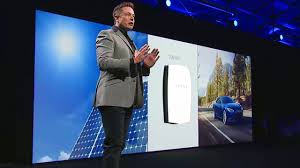$US100/kWh: It’s the magical number that has been painted as something of a Holy Grail for the battery storage industry, and the solar and electric vehicle technologies that will be whisked along in its footsteps.
It’s the goal, too, of Tesla founder and boss Elon Musk, who says he would be disappointed if battery storage costs did not break that barrier by 2020, from the $US350/kWh implied by the upcoming Tesla PowerWall battery storage system for homes and businesses. But can it be done?
Not everyone is so sure. As UBS analysts said in a recent report: “Many investors assume that reaching this target is a given; however, we are highly sceptical that this can be achieved.”
It pointed to its recent meetings with electric vehicle expert Jon Bereisa, the head of Auto Lectrification, and a former chief architect of the Chevy Volt. Bereisa notes that just the raw material cost in battery technology today is in the range of $US115-$US130/kWh.
This means that at a very minimum, getting costs down to below $US100/kWh will require significant improvements in chemistry.
“Even assuming density can double, which is theoretically possible but not available with today’s technology, raw material costs would be $US70-$US80/kWh range, leaving little room for all manufacturing costs and the pack cost.
This could be crucial for companies like Tesla, looking to the mass market both for the upcoming Tesla 3 family model, and for mass-market take-up of its PowerWall battery storage system. According to UBS, he suggests a best case scenario of $US133-$US155/kWh by 2025.
In countries like Australia, however, given the high cost of electricity, the structure of tariffs and the excellent solar resource, battery storage could become compelling for the mass market at around $US250/kWh. Some analysts suggest it is already break-even.
(To be clear, we are talking about the price of the battery storage technology, not the all-in installed costs which includes inverters and other installations costs).




View Comments
You published a piece last year which stated that the cost of materials in Panasonic/Tesla batteries was ~$70/kWh.
"Navigant estimates the cost of materials going into a battery at the Tesla Gigafactory on a processed chemical basis (not the raw ore) is $69/kWh [this metric is per kW per hour of operation].
The cost of the battery is only ~10-20% higher than the bill of materials – suggesting a potential long-term competitive price for Lithium Ion batteries could approach ~$100 per kWh."
http://reneweconomy.com.au/2014/battery-storage-costs-plunge-below100kwh-19365
Is not the 100kWh Powerpack sold by Tesla for $250/kWh?
I presume it includes coolant and everything.
GM said something about buying batteries from LG for $145/kWh.
Yes, the $145/kWh GM/LG Chem price is for battery cells at the wholesale level. The Powerpack is an assembled battery pack being sold at retail.
A year ago October Giles published a piece quoting one of the Navigant people stating that Tesla was paying Panasonic $180/kWh for cells. And that it is expected that prices should fall about 30% when the Gigafactory is running. That would put P/T cells around $130/kWh.
Here's a fun graphic. The numbers on the horizontal axis are battery pack prices. At $130 to $145/kWh battery pack costs should be under $200/kWh.
Some are quite confident about solid state lithium technology.
24M say they are simply using a different manufacturing process to make semi solid state Li-ion batteries to improve energy density.
There is an interesting article in Quartz about 24M and how Sony started making Li-ion batteries in 1991.
Sony had a spare cassette tape factory at the time and used it to make Li-ion cells. It was a good idea at the time - use the idle tape factory - but that is still how every Li-ion cell is made today!
"An ungainly legacy"
http://qz.com/433131/the-story-of-the-invention-that-could-revolutionize-batteries-and-maybe-american-manufacturing-as-well/
The key question is how many cycles can the battery withstand. If battery can cycle 1,000 times, the economics are different than 10,000 cycles.
If you've got a 240 mile range EV 1,000 cycles would mean 240,000 miles before the range dropped below 190 miles.
Can you believe this old discussion. $250/KWH just look at the offerings available now over A$1000/ KWH.
I'm not sure what point you are trying to make.
The article is about the cost of manufacturing lithium-ion cells. We know that the cost is something less than $145/kWh because LG Chem has agreed to sell cells to GM at that price. Some profit would be included along with non-manufacturing overhead. Take those out an the manufacturing cost moves closer to $100/kWh.
We now have predictions that the cost of manufacturing will reach $100/kWh in a few years.
http://www.greentechmedia.com/articles/read/How-Soon-Can-Tesla-Get-Battery-Cell-Cost-Below-100-per-Kilowatt-Hour
What you seem to be talking about is retail prices?